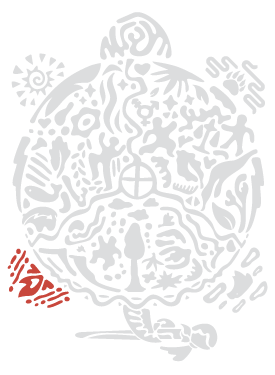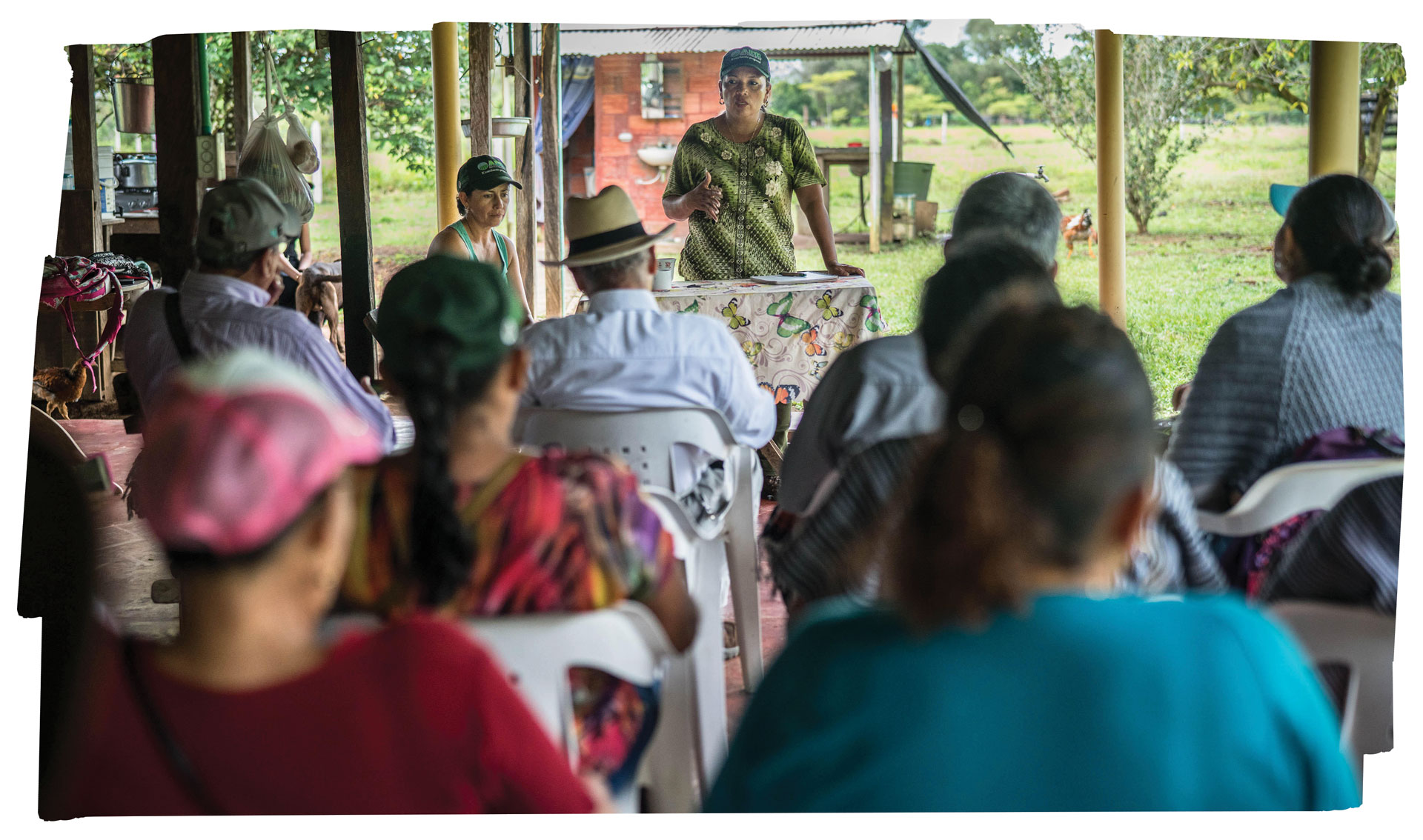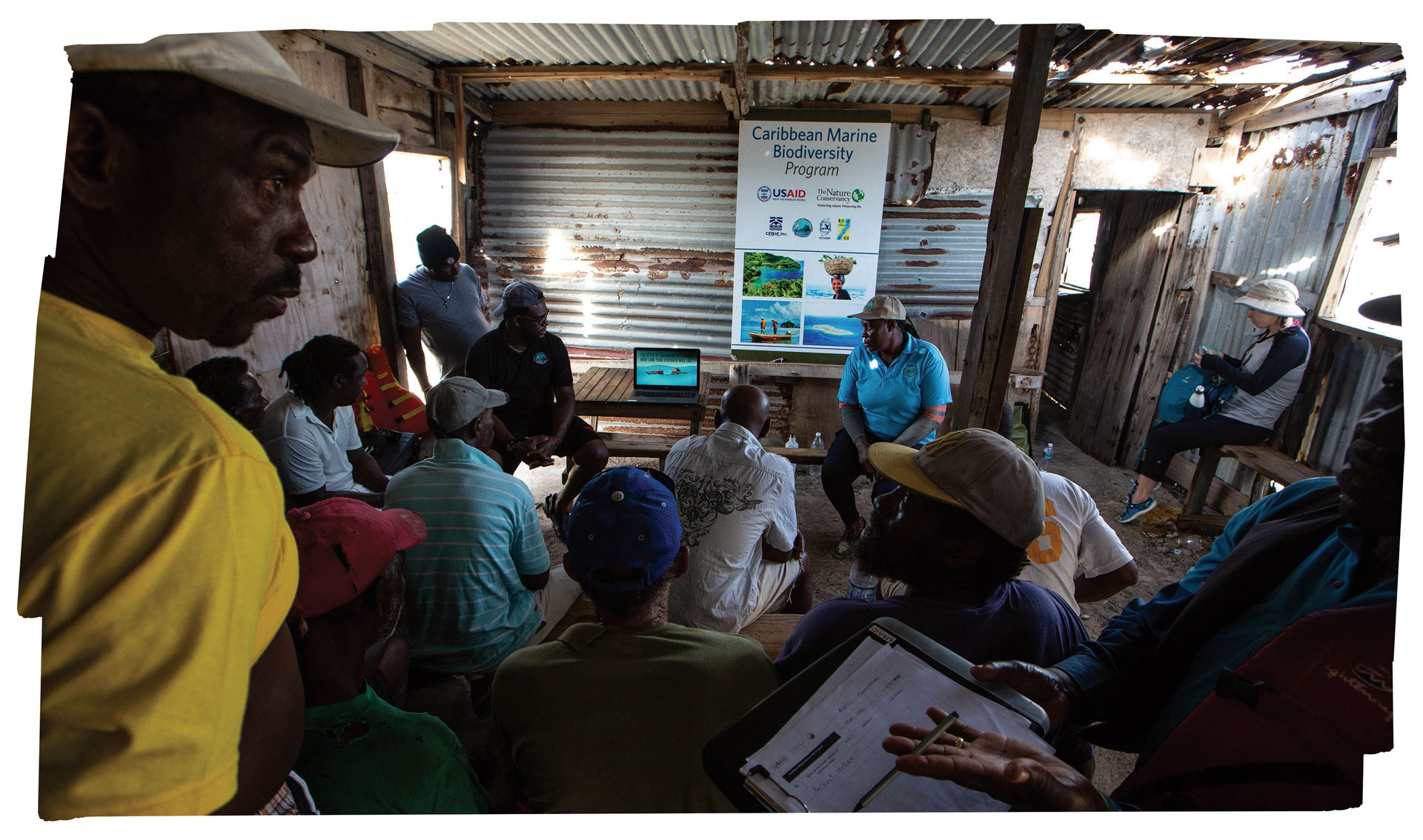Knowledge, Evidence, and Practice
KEY POINTS
- Multi-stakeholder dialogue and decision making (MSD) is most appropriate in complex situations with multiple actors that have diverse interests in lands, waters, or resources.
- MSD can have many purposes—from information sharing, to conflict resolution, to decision making—and can occur at and across the local, regional, or national/international scale. However, to be successful and influential, the scale of the MSD needs to match the scale of the issue and the actors involved.
- Strategies that involve MSD should be paired with strategies that increase Indigenous and local community leadership and/or capacity to engage, in addition to training for other stakeholders on how to engage effectively and respectfully with Indigenous Peoples and local communities.
- Skillful and consistent facilitation of MSD is critical for creating connections and social cohesion among the various actors, and for supporting negotiations, collective learning, and conflict resolution over time.
- Power dynamics are an important consideration in MSDs and failing to recognize and address them can serve to perpetuate existing inequities in the system.
- Depending on the format and need, MSD can be set up as short-term working groups or long-term institutions—enduring platforms or forums for dialogue can be essential if on-going conflict resolution and decision making around a set of regulations or agreements will be needed.
KEY TERMS
Multi-Stakeholder Dialogue—a forum that brings actors with a shared interest in an issue or decision into contact with one another to exchange information and institutional knowledge, generate solutions and relevant good practices, enhance trust, resolve conflict, and/or come to a decision. This forum can be short-term or long-term, can occur at a variety of scales, and can link to other MSDs.
Rightsholder—a person or group of people with recognized rights to provide or withhold consent in decision making about lands, waters, or resources management. We refer to Indigenous Peoples as “rightsholders” given their internationally recognized human rights most recently articulated in the 2007 United Nations Declaration on the Rights of Indigenous Peoples.
Stakeholder—a person or group of people with an interest in lands, waters, or resources. Sometimes referred to as “interest holder.”
Understanding Multi-Stakeholder Dialogue and Decision Making
In any given natural resource management context, there are typically multiple actors or groups with an interest in lands, waters, or resources, and oftentimes these actors may have competing and overlapping claims or use rights. A wide range of stakeholders may wish to influence the use and management of natural resources, particularly in cases where rights are unclear, not formalized, or resources are open access. Contexts are complex with power dynamics at play and are often situated within a history of inequities when it comes to meaningful participation—particularly for Indigenous Peoples and local communities. Indigenous Peoples specifically are considered “rightsholders”—not “stakeholders”—in consideration of and respect for their internationally recognized human rights to provide or withhold consent in decision making about their territories or resources, in addition to localized country, region, or state rights associated with Indigenous Peoples.
Multi-stakeholder Dialogue (MSD) aims to bring relevant rightsholders and stakeholders into contact with one another. MSD has much in common with governance and collective action aspects covered in the “Strong Leadership, Governance, and Management Capacity” section (Pillar 2). However, unlike that pillar, which is focused on capacity-building within the community or community organization, MSD focuses on inter-group/inter-stakeholder capacity and collaboration, which comes with its own needs and challenges and can be highly matrixed.
MSD—when well-designed and executed—can be used to meet various objectives, such as to enhance levels of trust and social cohesion between different actors, share information and institutional knowledge, generate solutions and relevant good practices, foster collaboration and cross-learning, clarify rights, balance the power for those involved, address conflicts, or come to decisions. With sufficient time, resources, and preparation, MSD can be a very effective tool for bringing diverse constituencies together to build consensus around complex, multifaceted and—in some cases—divisive issues.88 In fact, a recent systematic review and analysis found multi-stakeholder dialogue was important to community-based conservation success, and that projects that include such activities have a higher probability of achieving positive human well-being and environmental outcomes.16
In the case of decision making MSDs, the forums may include people who make decisions, those who influence decisions, as well as those who are affected by the decisions. In these situations, it is important to clearly identify the purpose and authority of the multi-stakeholder engagement to generate any action or decision. As it relates to partnerships with Indigenous Peoples and local communities, conservation organizations can support and strengthen their ability to participate, influence, and make decisions in such forums, as well as educate other stakeholders on how to engage effectively and respectfully with Indigenous Peoples and local communities. Table 4 lists some of the roles conservation organizations might play in MSD, keeping in mind they may hold multiple roles in the same MSD or across MSDs.
Table 4: Roles for conservation organizations in MSD.
| Role | Description |
|---|---|
| Convener | Organizing the structure for different actors to engage in dialogue—could include funding of the forums |
| Facilitator | Facilitating the dialogue itself—including moving the agenda forward, conflict resolution, and consensus building |
| Capacity-builder | Building capacity of various actors to engage with each other effectively and respectfully |
| Supporter | Providing funding and logistical support for Indigenous and local community leadership participation in MSD, particularly those requiring significant travel |
| Implementer | Supports participating individuals and organizations in implementing decisions, actions, and follow up needs that emerge from the MSD |
MSD can occur at and between many scales—from local level examples with one community, a corporate entity, and/or local government with an interest in a discreet place or resource (e.g., water user associations in a watershed, fisheries co-management arrangements), to the regional level involving multiple actors over one or more jurisdictions (e.g., Amazonia Agora platform for the sustained reduction of deforestation in Pará, Brazil), to the global level taking place at the national or international scale (e.g., Micronesia Challenge to effectively conserve 30 percent of near-shore marine resources, United Nations Framework Convention on Climate Change). Critically, the appropriate scale of the MSD depends on the scale of the issue and the actors involved. Further, it is possible to have many overlapping MSDs that address issues at different spatial scales, and MSDs that are convened temporarily or permanently.37 Bridging organizations— often NGOs or research institutions—can play a crucial role as facilitators, creating connections among the various actors, and supporting negotiations, collective learning, and conflict resolution.89-90
MSD is important across terrestrial, coastal, and freshwater ecosystems, as each context is includes multiple actors with sometimes divergent interests. However, MSD is particularly critical in coastal and freshwater systems due to the different rights and tenure structures in these spaces, where multiple actors or institutions may have legitimate rights over the same resource, where there can be multiple users (including those external to where the resource is), where there are fewer “exclusive” or private rights, and (in the case of rivers and streams) where upstream users can have impacts on the quality and quantity of resources for downstream users. Given these additional complexities of natural resource management in the freshwater and coastal spaces, MSD is often a critical strategy to navigate these challenges. In recognition of government limitations, there is greater movement toward decentralized management that favors inclusive and participatory decision making approaches such as this.
The Effectiveness of Multi-Stakeholder Dialogue and Decision Making
See “Tool 8: Key Attributes of Effective Multi-Stakeholder Dialogue and Decision Making” for a checklist with key criteria for effective MSD.
See “Tool 9: The Social Innovation Lab” for a guide to an MSD approach that focuses on bringing together diverse groups of people in conflict over complex and challenging problems to jointly co-develop and test solutions.
Several factors influence the effectiveness of MSD. For example, a key driver for participation by all parties is the relevance of the issue. When the management challenge or issue is immediate and urgent, social pressure for all to participate is often high, especially where interdependence between stakeholders is obvious.91 In addition, it is critical that the full suite of actors is included—namely relevant rightsholders and stakeholders who have an interest in and stand to be impacted by the management challenge or issue, as well as those with knowledge to skillfully facilitate.91 Further, if the MSD is not a decision making body itself (e.g., convened for knowledge sharing or conflict resolution), there must be a link to the decision making process in order to influence it.92
MSDs work best when they:
- embrace conflicts and connections within and beyond the group, creating space for individual actors’ agendas and discord, while also creating the space to meaningfully engage across conflict (rather than focusing on the collective goals and harmony of the team),
- experiment systematically with different perspectives and co-created solutions, taking one step at a time and building on the information that is gained through experimentation (rather than insisting on clear agreements about the problem, solution, and plan before action is taken), and
- focus on participants’ role in perpetuating the current situation and creating an alternative solution (rather than focus on changing what other people are doing).93
This is championed by proponents of the “social innovation lab” approach, which is one type of MSD that specializes in complex and unpredictable issues that include diverse sets of actors often with different world views and understandings of the problem.93 Social innovation lab approaches to systems change rely on convening a subset of the larger system using highly skilled facilitation. Such approaches break down hierarchies and foster connections, grasp the nature of the whole system including differing perceptions of the problem, generate reflections on various roles within the system, and co-create/experiment with possible solutions. This process often leads to innovative ideas and forward progress where issues were previously “stuck.”
Thus far, evidence on the effectiveness of MSD in achieving conservation goals is still emerging; robust monitoring and evaluation programs could help fill these knowledge gaps.90 Analysis of examples of MSD finds that positive impacts on social outcomes—such as rights recognition, increased access to information, and tenure security—have been observed in many cases; however, this appears to be very closely tied to the level and quality of participation by local communities. For example, an analysis of several MSDs initiated through the European Union Forest Law Enforcement, Governance, and Trade (EU-FLEGT) Facility found a general correlation between strength of participation and extent of positive social impacts across the reviewed case.94 Whereas in Brazil’s Pantanal Wetlands, conservation and government activities attempted to assure sustainable fisheries through a superficial co-management approach based around a regulating commission comprising legislators, scientists, and enforcers. The lack of effective fisher participation in the MSD led to lack of understanding of management requirements, fishers’ distrust of the MSD’s urban-based scientists, and noncompliance with rules.95-96







